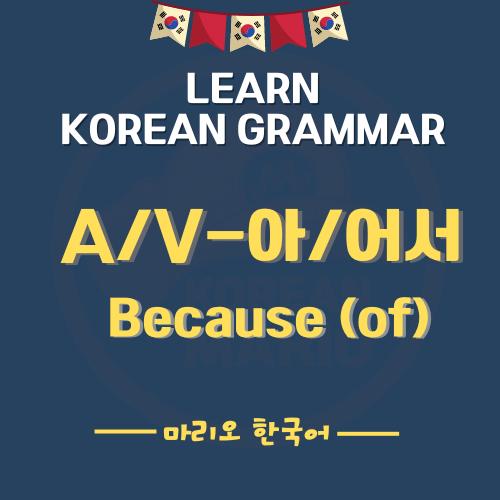A/V-아/어서 is used to express that the information in the first clause is the reason for or the cause of succeeding clause. It corresponds to ‘because(of)’, ‘on account of’, and ‘so… that…’ in English.

Learn more daily content on Instagram!
1. If the stem ends in the vowel ㅏ or ㅗ, then -아서 is used.
2. Otherwise, -어서 is used.
3. If the verb ends in 하다, the form changes to 해서.
4. In the case of 이다, 이어서 is used, except in conversation, 이라서 is used.
stem ends in the vowel ㅏ or ㅗ
to come 오다 → 와서 because I come
to go 가다 → 가서 because I go
to live 살다 → 살아서 because I live
to see 보다 → 봐서 because I see
stem ends in the vowel other thanㅏ or ㅗ
읽다 → 읽어서 because I read
있다 → 있어서 because I have
길다 → 길어서 because it’s long
먹다 → 먹어서 because I eat
words ending in 하다
to be slimmed 날씬하다 → 날씬해서 because he/she is slimmed
to exercise 운동하다 → 운동해사 because I exercise
to clean 청소하다 → 청소해서 because I clean
to be tired 피곤하다 → 피곤해서 because I am tired
Examples
- 밥을 먹어서 배가 불러요. (I ate, so I’m full.)
- 비가 와서 우산을 가져왔어요. (It’s raining, so I brought an umbrella.)
- 길이 멀어서 버스를 탔어요. (The distance was long, so I took the bus.)
- 일찍 일어나서 아침 운동을 했어요. (I woke up early, so I exercised in the morning.)
- 시간이 없어서 빨리 가야 해요. (I don’t have time, so I need to hurry.)
- 추워서 따뜻한 옷을 입었어요. (It’s cold, so I wore warm clothes.)
- 너무 피곤해서 일찍 자려고 해요. (I’m so tired, so I want to sleep early.)
- 바빠서 연락을 못 했어요. (I was busy, so I couldn’t contact you.)
- 먹고 싶어서 음식을 주문했어요. (I wanted to eat, so I ordered food.)
- 목이 말라서 물을 마셨어요. (I was thirsty, so I drank water.)
- 영화가 재미있어서 끝까지 봤어요. (The movie was interesting, so I watched it until the end.)
- 친구를 보고 싶어서 만났어요. (I missed my friend, so we met up.)
- 공부를 하다가 졸려서 잠시 쉬었어요. (I got sleepy while studying, so I took a short break.)
- 화가 나서 조용히 있었어요. (I was angry, so I stayed quiet.)
- 춥다고 해서 난로를 켰어요. (It’s cold, so I turned on the heater.)
- 책이 재미있어서 밤을 새웠어요. (The book was interesting, so I stayed up late reading.)
- 너무 더워서 시원한 음료를 마셨어요. (It was too hot, so I drank a refreshing beverage.)
- 운동을 하고 싶어서 헬스장에 갔어요. (I wanted to exercise, so I went to the gym.)
- 시간이 남아서 영화를 보러 갔어요. (I had some free time, so I went to watch a movie.)
- 생일이라서 친구들과 파티를 했어요. (It was my birthday, so I had a party with friends.)
Difference Between -아/어서 and -(으)니까
아/어서
1. Cannot be used in instructions or recommendations sentences.
– 날씨가 더워서 택시를 탈까요? (x)
– 시간이 있어서 기다려 주세요. (o)
2. Tense markers such as 았/었/겠 cannot be used.
– 아침에 늦게 왔어서 늦게 퇴근할게요. (x)
3. Used mainly to express a general reason.
A: 모임에 왜 안 갔어요? Why didn’t you go to the gathering?
B: 바빠서 안 갔어요. I was busy so I did not go.
4. Can be used with common words of greeting, such as 반갑다, 고맙다, 감사하다, 미안하다.
– 도와주셔서 고마워요. (o)
-(으)니까
1. Can be used in instructions or recommendations sentences.
– 날씨가 더우니까 택시를 탈까요? (o)
-시간이 있으니까 기다려 주세요. (o)
2. Tense markers such as 았/었/겠 can be used.
– 아침에 늦게 왔으니까 늦게 퇴근할게요. (o)
3. Used when stating a subjective reason or providing a basis for a particular reason. It is mainly used when the other party also knows about the topic under discussion.
A: 모임에 왜 안 갔어요? Why didn’t you go to the gathering?
B: 바쁘니까 안 갔어요. I was busy (as you know) so I did not go.
4. Cannot be used with common words of greetings.
– 도와주니까 고마워요. (x)
Learn Korean With More Blogs

- EPS Free Course
- Learn with BTS
- Numbers and Words
- Travel and Daily Korean
- TOPIK
- Hangul – The Korean Alphabets
- Beginner Grammar
- Intermediate Grammar
- Tools Names
Table of Contents

